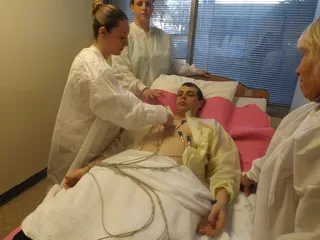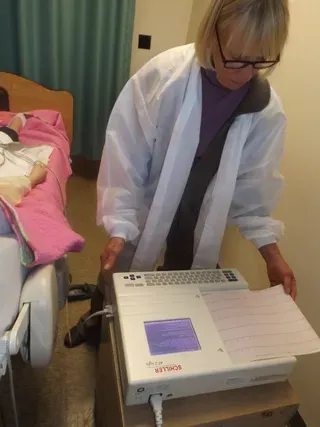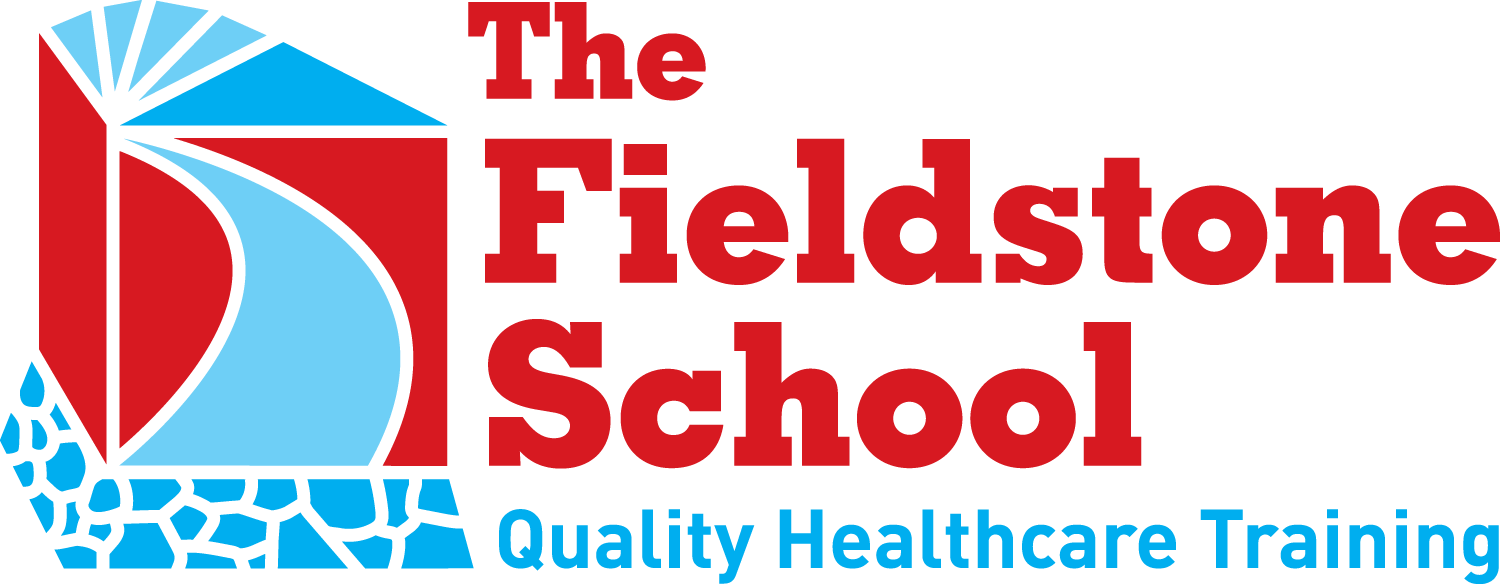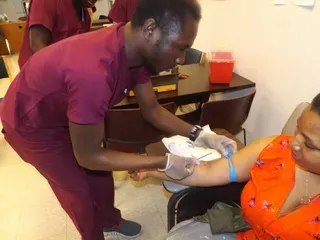ELECTROCARDIOGRAPHY (ECG) (Hybrid and In-Person)
An electrocardiography technician, also referred to as an ECG Technician, is the person responsible for performing diagnostic tests on patients in healthcare settings to assess the heart (cardiac) rhythm and rate.
The well-trained ECG technician is an integral part of the health care team. As a professional with these skills, you may enjoy flexible schedules, competitive salaries, and such benefits as health and life insurance, paid vacations and paid sick time.
Technicians are in demand in a number of health care settings, including hospital specialty departments, physicians’ offices, cardiac rehabilitation centers, clinical laboratories, and health maintenance organizations and clinics.

Students may choose to study both our ECG and Phlebotomy Programs.
PHLEBOTOMY (Hybrid and In-Person)
A phlebotomy technician, or phlebotomist, is trained to draw blood from patients for tests, transfusions, donations, and research. He or she uses a variety of techniques, such as drawing blood from veins, or performing heel or finger sticks.
As a professional with these skills, you may enjoy flexible schedules, competitive salaries, and such benefits as health and life insurance, paid vacations, and paid sick time.
Phlebotomists are in demand in a number of health care settings, including hospital specialty departments, physicians’ offices, cardiac rehabilitation centers and clinical laboratories, health maintenance organizations and clinics.
Students may choose to study both ECG (Electrocardiography) and Phlebotomy Programs.

PHLEBOTOMY (Hybrid and In-Person)
A Phlebotomy Technician, or phlebotomist, is trained to draw blood from patients for tests, transfusions, donations, and research. He or she uses a variety of techniques, such as drawing blood from veins, or performing heel or finger sticks.
As a professional with these skills, you may enjoy flexible schedules, competitive salaries, and such benefits as health and life insurance, paid vacations, and paid sick time.
Phlebotomists are in demand in a number of health care settings, including hospital specialty departments, physicians’ offices, cardiac rehabilitation centers and clinical laboratories, health maintenance organizations and clinics.
Students may choose to study the dual certificate program ECG (Electrocardiograph) Technician and Phlebotomy Technician Program.

NURSE AIDE & HOME HEALTH AIDE (Hybrid and In-Person)
This program is designed to prepare you to take the Massachusetts certification examination for Nurse Aide, and to provide you with the knowledge and skills necessary to gain employment in healthcare. Nursing assistants and home health aides are among the fastest growing occupations.
According to the US Bureau of Labor Statistics, the number of CNA and home health aides jobs is expected to grow by as much as 16 percent over the next decade.
You will become a member of a very valuable paraprofessional workforce; a workforce that is responsible for providing assistance to individuals in many different healthcare settings.
Whether you choose to work in someone’s home, the hospital, or a long-term care facility, you can make a difference in the quality of a person’s life.
Nurse aides and home health aides enjoy flexible schedules, competitive salaries, and such benefits as health and life insurance, paid vacations, and paid sick time.
PHLEBOTOMY/ELECTROCARDIOGRAPHY (ECG) (Hybrid and In-Person)
After completion of the Phlebotomy/ECG program, the student is trained for two valuable skills in the healthcare industry.
An electrocardiography technician, also referred to as an ECG technician, is the person responsible for performing diagnostic tests on patients in healthcare settings to assess the heart (cardiac) rhythm and rate.
The well-trained ECG technician is an integral part of the health care team.
A phlebotomy technician, or phlebotomist, is trained to draw blood from patients for tests, transfusions, donations, and research. He or she uses a variety of techniques, such as drawing blood from veins, or performing heel or finger sticks.
As a professional with these skills, you may enjoy flexible schedules, competitive salaries, and such benefits as health and life insurance, paid vacations and paid sick time.
ECG technicians and phlebotomists are in demand in a number of health care settings, including hospital specialty departments, physicians’ offices, cardiac rehabilitation centers, clinical laboratories, health maintenance organizations and clinics.

Students may choose to study either the ECG Program or the Phlebotomy Program, or both.




